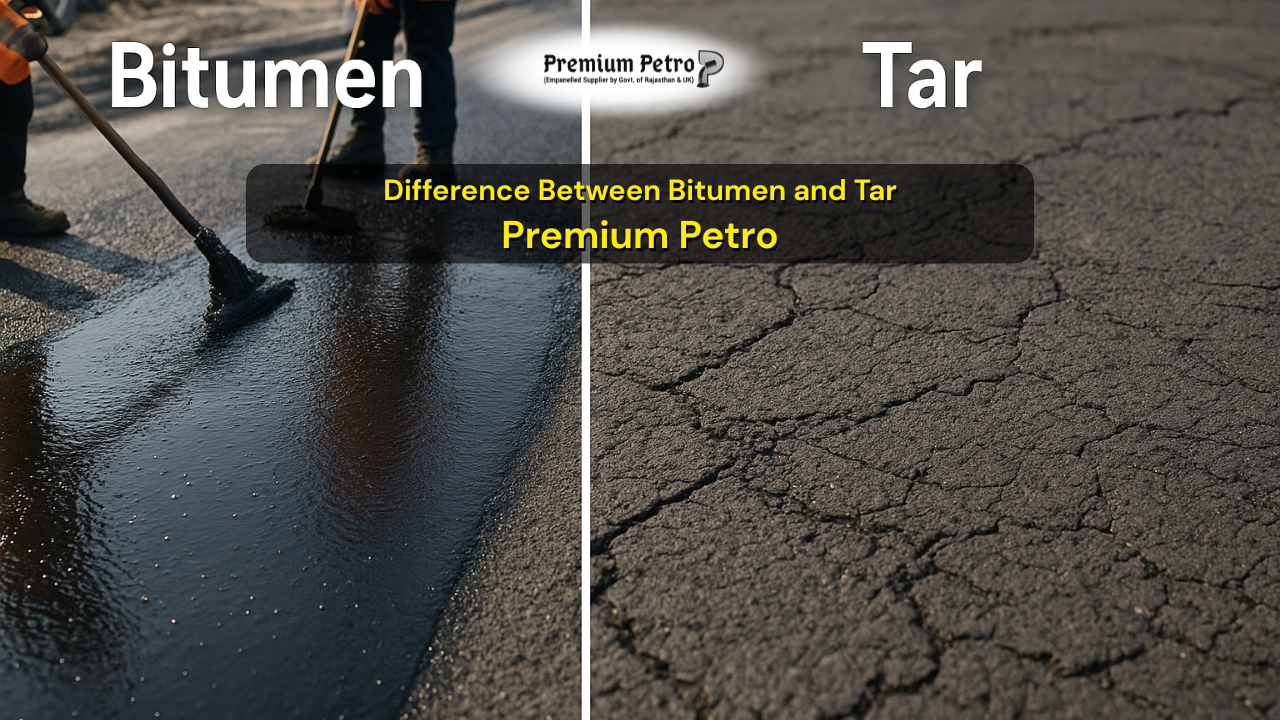2025-09-19 | Pankaj Jangid
Difference Between Bitumen and Tar

Introduction
When it comes to road construction and waterproofing, many people confuse bitumen and tar because both are black, sticky materials. But the truth is, they are very different in origin, performance, and safety. Knowing these differences helps contractors, engineers, and even buyers make the right choice. With growing demand from bitumen manufacturers in India, it’s important to understand what sets bitumen apart from tar.
What is Bitumen?
- Bitumen is a by-product of crude oil refining.
- It is made up of stable hydrocarbons with very little free carbon.
- Commonly used for road construction, waterproofing, and industrial applications.
- Flexible, durable, and more resistant to weather conditions compared to tar.
Popular Grades of Bitumen in India:
- VG 10 Bitumen: Used in colder regions; suitable for low-traffic roads.
- VG 30 Bitumen: Most widely used for highways and general road construction.
- VG 40 Bitumen: Preferred in hot climates and for heavy traffic roads.
Special types include CRMB Bitumen (Crumb Rubber Modified Bitumen), which improves elasticity and performance in high-stress conditions.
What is Tar?
- Tar is made by destructive distillation of coal, wood, or peat.
- It has a high free carbon content, making it brittle in cold weather.
- Less flexible and more toxic compared to bitumen.
- Due to health hazards (carcinogenic compounds), tar is rarely used in modern road construction.
Key Differences Between Bitumen and Tar
| Property | Bitumen | Tar |
| Source | Crude oil refining | Destructive distillation of coal/wood |
| Flexibility | High (ductile) | Low (brittle in cold) |
| Weather Resistance | Exellent | Moderate |
| Safety | Low Toxicity | High Toxicity, carcinogenic |
| Modern use | Raod, Runways, Waterproofing | Limited (wood, preservation, old roofing) |
In short: Bitumen is the standard choice for roads and infrastructure, while tar is outdated and restricted.
Why Bitumen is Preferred in India
India’s road network is among the largest in the world, and quality binders are essential for durability. Bitumen manufacturers in India focus on producing reliable grades like VG 10, VG 30, VG 40, and CRMB bitumen to meet diverse needs.
- VG 10 Bitumen Uses: Suitable for spraying, surface dressing, and colder regions.
- VG 30 Bitumen: Standard for national highways and state roads.
- VG 40 Bitumen: Used in heavy-duty roads, industrial areas, and hot climate zones.
- CRMB Bitumen (Crumb Rubber Modified Bitumen): Enhances performance in high-traffic and high-stress roads.
Additionally, bitumen import in India has increased to meet infrastructure growth, with many VG 40 bitumen importers in India supplying material for expressways and industrial projects.
Top Bitumen Suppliers and the Indian Market
These products are designed to enhance road durability, resist high traffic loads, and withstand India’s extreme weather conditions.
Among the trusted names in the industry, Premium Petro stands out as a reliable supplier of government-approved bitumen and emulsions. With a focus on quality and consistency, Premium Petro ensures timely delivery of VG30 bitumen, CRMB, and PMB at competitive rates. The company has built a strong reputation for serving contractors, road developers, and government agencies with products that meet international standards.
Thanks to its strong distribution network and commitment to quality, Premium Petro is helping accelerate India’s growth story by supplying the materials that build better roads and infrastructure. As the demand for durable roads continues to increase, Premium Petro and other leading suppliers are set to play a vital role in shaping the future of India’s transport and construction sector.
- Top bitumen manufacturers in India are ensuring quality as per international standards.
- Imports also play a key role, especially for specialized grades.
- Whether you are a contractor or project consultant, knowing the right grade and trusted suppliers makes all the difference.
Conclusion
To sum up, bitumen and tar are not the same. Bitumen, derived from petroleum, is flexible, durable, and safe for modern construction, while tar, derived from coal, is brittle and hazardous. Today, bitumen manufacturers in India supply VG-graded and CRMB bitumen to meet the growing needs of highways, airports, and waterproofing projects.
If you’re planning construction, always choose the right grade of bitumen (VG 10, VG 30, or VG 40) and source it from trusted suppliers or importers. This ensures safety, durability, and long-term performance for your project.
Frequently Asked Questions
Q1. Is bitumen and tar the same?
A. No, Bitumen comes from crude oil refining, while tar is made from coal or wood distillation.
Q2. Which bitumen grades are common in India?
A. VG 10, VG 30, VG 40, and CRMB bitumen are widely used.
Q3. What are VG 10 bitumen uses?
A. VG 10 is used in colder regions for low-traffic roads and surface dressing.
Q4. Why is CRMB bitumen important?
A. Crumb Rubber Modified Bitumen improves elasticity, making roads more durable under heavy traffic.
Q5. Who are the top bitumen manufacturers in India?
A. Several reputed manufacturers and VG 40 bitumen importers in India supply quality material across the country for highways and industrial projects.
